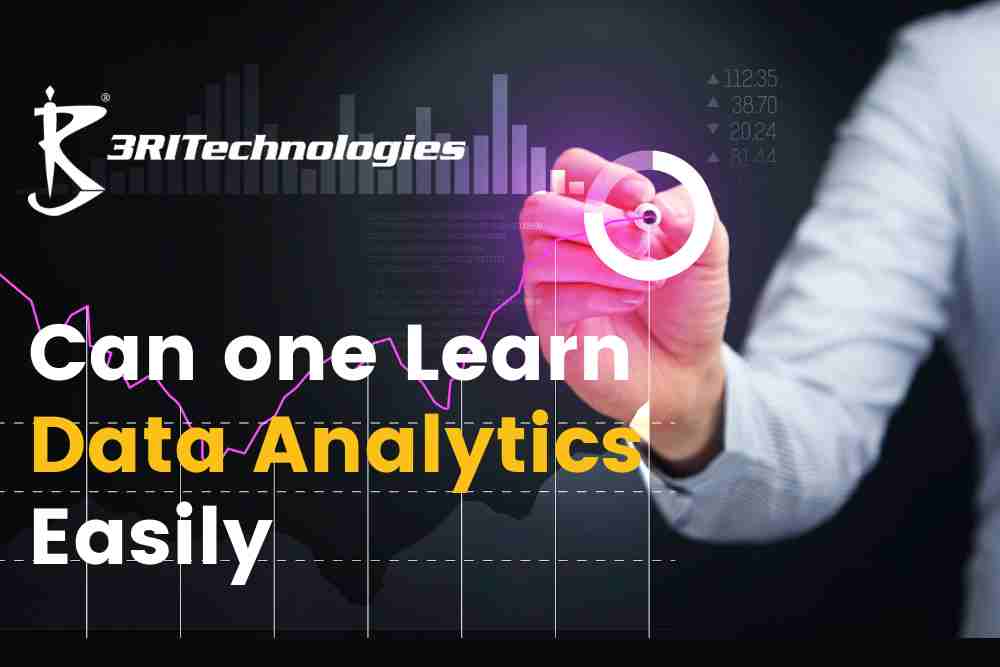Many aspiring professionals wonder, “is data analytics easy to learn?” The truth is, while it requires dedication, the answer to “can anyone learn data analytics?” is a resounding yes—provided you have the right approach and resources. It’s less about being a math genius and more about having curiosity and a structured learning path. This guide will demystify the process and show you exactly what it takes to succeed. For those ready to start their journey with expert guidance, our Data Analyst Courses In Pune are designed to build your skills from the ground up.
The Key Skills You Need to Start Your Data Analytics Journey
The practice of evaluating data to extract business insights to support an organization’s decision-making process is known as data analytics. We employ a variety of data analytics techniques for a range of purposes, such as cause and effect analysis within businesses, forecasting future trends, and evaluating consumer behavior. Tasks related to data analytics can often be categorized into four groups.
Predictive data analysis: Predictive data analysis, as the name implies, makes predictions about the future using data from the past. Predictive analytics is what we use to forecast things like prices, profitability, sales, inventories, and staff and customer attrition. Additionally, it is employed in the forecasting of macroeconomic variables like property values, stock market values, GDP growth rates of nations, etc.
- Prescriptive data analysis: The practice of assessing data to suggest the optimal course of action for decision support, resource allocation, supply chain optimization, etc. is known as prescriptive data analysis.
- Diagnostic data analysis: Cause and effect analysis is used in diagnostic data analytics to provide answers to queries. By spotting patterns and relationships in the data, diagnostic analytics uses past data to provide answers to queries or solve specific issues.
- Descriptive data analysis: To fully explain or give a complete account of historical events using data, we employ descriptive data analysis. Financial analysis, client segmentation, and other related tasks are performed using descriptive data analytics.
Unlock the power of data with our comprehensive Data Science course in Pune.

How To Learn Data Analytics: A Step-by-Step Guide
Whatever approach you take to learning data analytics, you should still follow these recommendations.Study the Principles.
- Take up one or more programming languages.
- Devote Time to Learning and Education (Make a Schedule)
- Develop Your Expertise
- Get to Know the Common Tools
- Get Real-World Experience
- Look for a Guide
1. Learn to program in one or more languages.
Python is a fantastic choice for your first programming language as you’re just getting started. In addition to being user-friendly for beginners, it offers a vast array of libraries that you can incorporate into your programs to provide data analysis functionality.
It’s easy to move to other programming languages after you have a firm grip of one. You’ll find it simple to transition to other object-oriented languages like Java or C++ because Python is an object-oriented language. At this point, you can also take up languages that use different programming paradigms with ease.
2. Devote Time to Learning and Education (Make a Schedule)
No matter the particular modality you select, learning data analysis is a process that requires patience. Whatever your schedule, it’s advisable to establish a regular learning regimen.
Make sure you allow adequate time for the development of a solid conceptual framework in data analysis. Putting what you’ve learnt into practice through data analysis tasks is also beneficial.
3. Develop Your Expertise
Following your mastery of the foundations, you still need to work on a few specialized skills. Let us examine what they are.
● Technical Skills
For any expert working in data analysis, the following technical abilities are essential.
● SQL
Gaining knowledge of SQL will also enable you to progress to other database systems, such as MySQL and NoSQL.
● Business Intelligence
Creating insights that can aid in the resolution of business issues is the main objective of most data analysis. For this reason, it’s critical that you can understand the company context in order to increase profits and obtain a competitive advantage in the market.
● Data Visualization
The basic goal of most data analysis is to produce insights that can help with business issue resolution. Therefore, it’s essential that you can understand the company context in order to increase profits and obtain a competitive edge in the market.
● Machine Learning
With a solid understanding of machine learning techniques, you can utilize this to create programs that primarily carry out autonomous exploratory data analysis.
● Soft Skills
New data scientists sometimes disregard soft skills. Nonetheless, they are necessary if you want to be successful in your line of employment. These are a handful that need your attention.
● Problem-Solving
Soft skills are sometimes overlooked by novice data scientists. But if you want to be successful in your line of employment, these are necessary. Here are a few that require your consideration.Learn data engineering skills from experts. only at Data Engineering Certification Course.
4. Collaboration
You will regularly work with data scientists, business analysts, and software engineers as part of your job. Collaboration and clear communication are critical abilities in this setting.
1) Get to Know the Common Tools
A variety of technologies are used by data analysts to expedite their job and carry out preset tasks.
2) Get Real-World Experience
It’s time for some practical assignments after you’ve gained some experience and expertise. Let’s examine various ways for you to obtain real-world experience.
5. Engage in Open-Source Project Work
One of the advantages of contributing to open-source projects is that you can build code in a piecemeal, beginner-friendly fashion and get experience with vast codebases.
1) Try to Get an Internship
Make sure you engage with your coworkers as much as possible after you do secure an internship. Your interactions with the full-time data analysts will be just as important as any work you complete during your internship.
2) Look for a Guide
You can benefit from finding a mentor in two significant ways. In addition, mentors can help you maintain motivation during what is typically a very personal experience. You can develop a personal rapport with your mentor so that you can seek guidance and advise from them on a human level in addition to technical advice.
Is Data Analytics Hard to Learn?
Learning data analytics is not difficult. Actually, when someone decides to transition from a non-technical to a technical career, this is one of the most common topics they choose to start with.
You must possess a solid grasp of machine learning, data analysis methods, etc. to be considered for a full-time position. It might need some time to develop these skills. None of the abilities I listed above are particularly difficult to learn, though. As a result, learning data analytics is quite simple.To Know More About courses Visit Job Oriented Course In Pune.

How Long Does It Take to Become a Data Analyst?
Depending on your past experience and education, how much time you can dedicate to learning, and the particular skills and information you must acquire, the time it requires to turn into a data analyst can vary.
Still, you can also acquire the necessary abilities by studying alone or participating in a program akin to a boot camp. The duration and intricacy of these programs might vary from a few weeks to many months.
How Long Does It Take to Learn Python for Data Analysis?
Generally speaking, learning the fundamentals of Python takes two to six months. But in a few of minutes, you will get enough knowledge to write your own brief program. Acquiring expertise in Python’s vast library may require several months or even years.
How to Become a Data Analyst with No Experience?
Although it may seem impossible to enter the arena of data analysis without any prior expertise, it is completely possible with the appropriate strategy and frame of mind. This is an easy-to-follow manual to assist you in making the move to become a data analyst:
• Acquire knowledge of statistical analysis, data cleansing, and data visualization—the fundamentals of data analysis.
• To learn the fundamentals of data manipulation, start using Excel.
• Credibility is increased by certifications from reputable platforms, particularly in situations when further professional experience is required.
• Keep meticulous records of every project you work on, detailing your approach, resources, and learnings.
•Acquire competencies such as analytical reasoning, troubleshooting, proficient correspondence, and meticulousness.
• Engage in data analysis groups or industry-specific internet forums and communities.
• Participate in conferences, workshops, and webinars to network with industry experts and gain knowledge from their experiences.
• Keep up with the most recent developments in technology, fashion, and data analytic tools.
• You can improve your profession by regularly participating in advanced courses and instructional resources.masters in the skills of Data Analytics Enroll in Data Analytics Course In Pune.
Data Analyst Roles and Responsibilities
Core Responsibilities
1. Data Collection
Data analysts gather information from many sources, such as third-party suppliers, publicly accessible databases, and internal databases. Next, they verify and authenticate the data to ensure that it is precise, all-encompassing, and coherent.
2. Data Processing
• Eliminating or updating inaccurate, omitted, or unnecessary data.
• Data reorganization or manipulation to prepare it for analysis. This frequently entails addressing missing values, transforming data types, and filtering data.
3. Data Analysis
• Using statistical methods to examine data and produce insightful conclusions. This includes testing hypotheses, regression analysis, and variance analysis.
•Forecasting future trends and behaviors through the application of machine learning methods and statistical algorithms.
4. Data Visualization
• Development and creation of data visualizations, like dashboards, charts, and graphs, to aid stakeholders in comprehending the findings of the investigation.
• Making use of tools for dynamic data analysis and visualization like Tableau, Power BI, or Qlik
5. Reporting and Decision Support
• Drawing conclusions from the data and offering useful insights to support corporate choices.
• Effectively and clearly communicating discoveries to audiences outside of the technical domain, frequently via written reports and oral presentations.
6. Skills Required for Data Analysts
Technical, analytical, and soft skills are all necessary for success as a data analyst. With these abilities, analysts may contribute to data-driven decision-making processes, effectively evaluate data, and convey findings. The following is a list of the fundamental skills required: Technical Proficiency.
7. Technical Skills
• It helps to know how to use statistical tools like R or SPSS.
• Programming languages like R and Python are necessary for tasks involving automation, analysis, and data manipulation.
• To access, alter, and query databases, one needs proficiency with database management systems and querying languages, especially SQL.
• The capacity to use tools like Tableau, Power BI, or even sophisticated Excel features to produce visual representations of data.
• Understanding machine learning techniques can be quite helpful, even though it’s not always required, particularly for predictive analytics.
Analytical Skills
• Capacity to address issues methodically and logically, challenging the veracity of assumptions and data.
• Analyzing data to find issues and address them, often with little notice.
• Data analysts must use extreme caution in their work to ensure accuracy and precision.
8. Soft Skills
• Proficiency in written and verbal communication is essential for translating technical data findings into comprehensible business language so that stakeholders can act accordingly
• Since data analysts frequently collaborate with teams from other departments or with outside clients, teamwork abilities are crucial.
• Capacity to prioritize work, oversee several projects at once, and adhere to deadlines Check out Data Science Online training and get certified today.
Is Data Analytics a Good Career Choice?
The amount of time needed to become a data analyst can vary based on your education and experience background, the amount of time you can dedicate to learning, and the particular skills and information you must acquire. A bachelor’s degree in a comparable discipline, such as computer science, statistics, or mathematics, must be obtained to work as a data analyst. A bachelor’s degree normally involves four years of intense coursework.
However, it is also possible to gain the necessary skills through self-study or a boot camp-style program. After acquiring the necessary training or skills, it could take some time to gather experience in the field before landing a full-time position as a data analyst.
Is Data Analytics The Same as Data Science?
Although both data scientists and data analysts are experts in data, there are several important distinctions between their roles, competencies, and duties:
• Role: Data scientists create and apply prediction models and algorithms using both structured and unstructured data.
• Skills: Advanced programming, data engineering, and machine learning abilities are necessary for data scientists.
• Responsibilities: While data scientists concentrate on creating and implementing predictive models and algorithms that might influence business results, data analysts usually concentrate on data cleansing, data analysis, and reporting.To Learn From the Experts Visit 3RI Technologies.
Conclusion:
Getting the appropriate educational background, being proficient in key technological areas, and gaining real-world experience are all necessary to become a data analyst. With commitment and ongoing education, you can become a skilled data analyst even though the path may be difficult.






